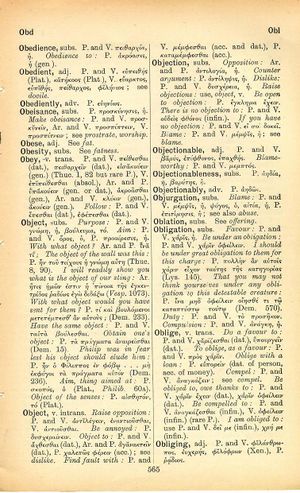object: Difference between revisions
Θέλομεν καλῶς ζῆν πάντες, ἀλλ' οὐ δυνάμεθα → Bene vivere omnes volumus, at non possumus → Gut leben wollen wir alle, doch wir können es nicht
m (Woodhouse1 replacement) |
mNo edit summary |
||
| Line 19: | Line 19: | ||
[[obtain one's object]]: [[prose|P.]] [[τὰ πράγματα ἀναιρεῖσθαι]] ([[Demosthenes|Dem.]] 15). | [[obtain one's object]]: [[prose|P.]] [[τὰ πράγματα ἀναιρεῖσθαι]] ([[Demosthenes|Dem.]] 15). | ||
[[Philip was in fear lest his object should elude him]]: [[prose|P.]] ἦν ὁ Φίλιππος ἐν | [[Philip was in fear lest his object should elude him]]: [[prose|P.]] [[ἦν ὁ Φίλιππος ἐν φόβῳ μὴ ἐκφύγοι τὰ πράγματα αὐτόν]] ([[Demosthenes|Dem.]] 236). | ||
[[aim]], [[thing aimed at]]: [[prose|P.]] [[σκοπός]], ὁ ([[Plato]], [[philib]]. 60A). | [[aim]], [[thing aimed at]]: [[prose|P.]] [[σκοπός]], ὁ ([[Plato]], [[philib]]. 60A). | ||
Revision as of 16:00, 6 July 2020
English > Greek (Woodhouse)
substantive
purpose: P. and V. γνώμη, ἡ. βούλευμα, τό.
aim: P. and V. ὅρος, ὁ, P. προαίρεσις, ἡ.
with what object? Ar. and P. ἵνα τί;
the object of the wall was this: P. ἦν τοῦ τείχους ἡ γνώμη αὕτη (Thuc. 8, 90).
I will readily show you what is the object of our sting: Ar. ἥτις ἡμῶν ἐστιν ἡ 'πίνοια τῆς ἐγκεντρίδος ῥᾳδίως ἐγὼ διδάξω (Vespae 1073).
with what object would you have sent for them? P. τί καὶ βουλόμενοι μετεπέμπεσθ' ἂν αὐτούς; (Dem. 233).
have the same object: P. and V. ταὐτὰ βούλεσθαι.
obtain one's object: P. τὰ πράγματα ἀναιρεῖσθαι (Dem. 15).
Philip was in fear lest his object should elude him: P. ἦν ὁ Φίλιππος ἐν φόβῳ μὴ ἐκφύγοι τὰ πράγματα αὐτόν (Dem. 236).
aim, thing aimed at: P. σκοπός, ὁ (Plato, philib. 60A).
object of the senses: P. αἰσθητόν, τό (Plato).
verb intransitive
raise opposition: P. and V. ἀντιλέγειν, ἐναντιοῦσθαι, V. ἀντιοῦσθαι.
object to: P. and V. ἄχθεσθαι (dat.), Ar. and P. ἀγανακτεῖν (dat.), P. χαλεπῶς φέρω, χαλεπῶς φέρειν (acc.); see dislike.
find fault with: P. and V. μέμφεσθαι (acc. and dat.). P. καταμέμφεσθαι (acc.).

